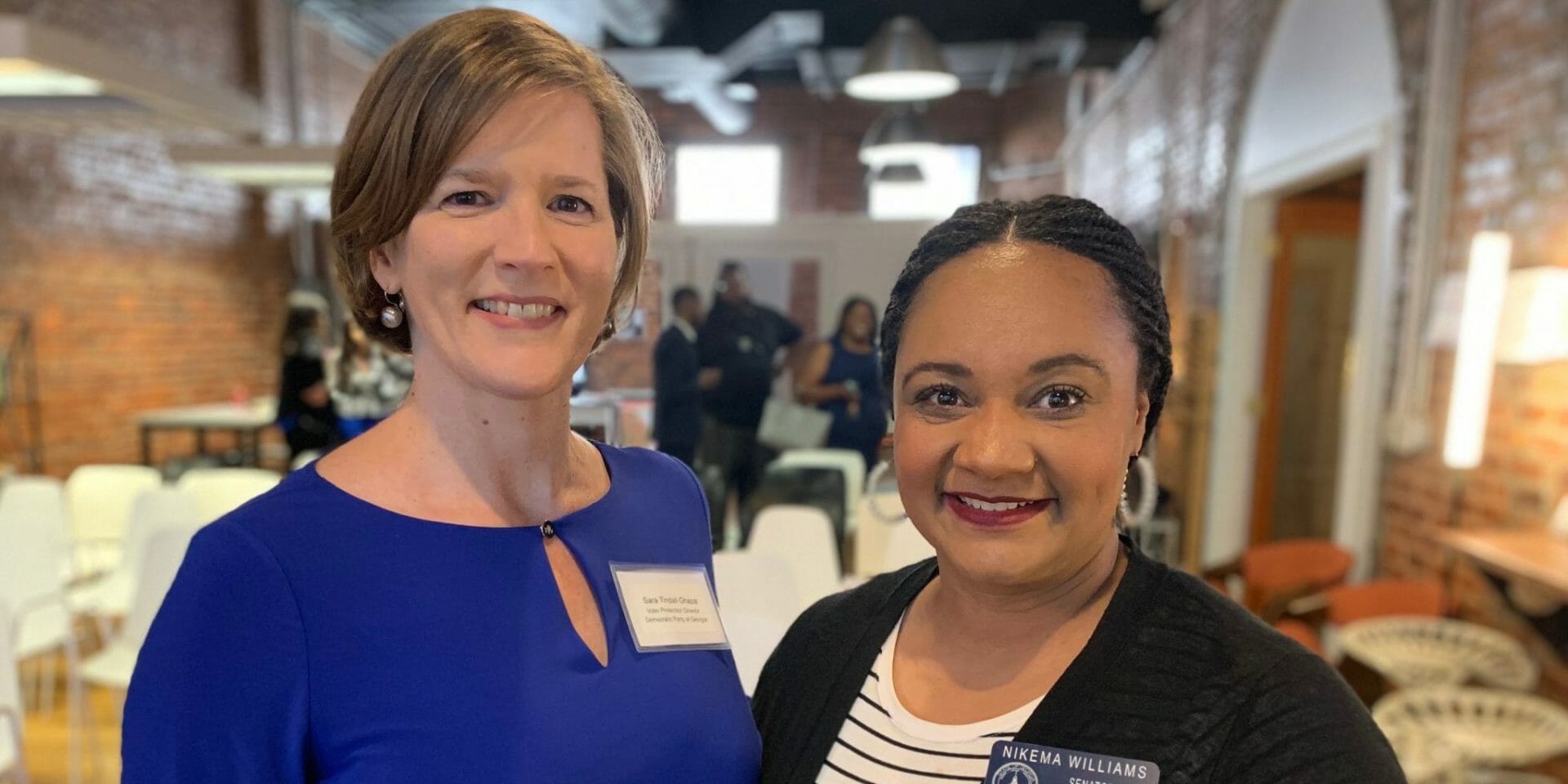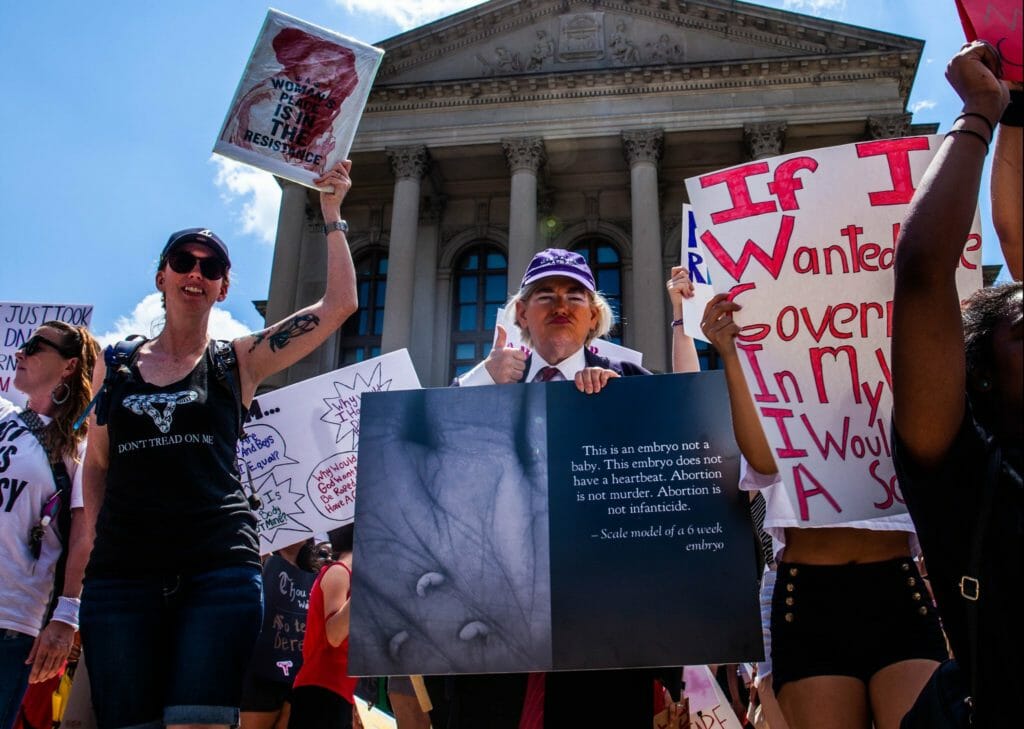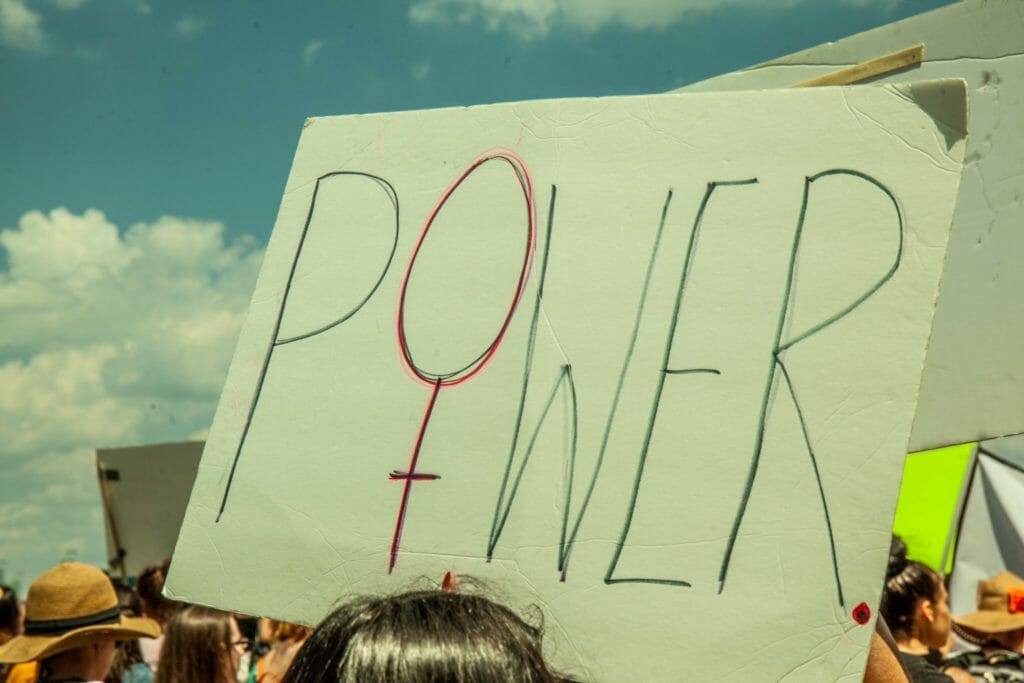This article was originally published on Sept. 4, 2019. It was updated to reflect a correction of a misspelling of Rep. David Dreyer\’s name.
The Democratic Party of Georgia (DPG) hosted a panel at Ohio River South offices on Wed., Sept. 4, 2019, which was moderated by Voter Protection Director for Georgia Democrats Sara Tindall Ghazal. The panel consisted of Chair of the Democratic Party of Georgia Nikema Williams, Rep. David Dreyer (GA-59), and DeKalb County Board of Commissioners District 5 member Demetrius McCoy. The DPG organized this event to discuss what Georgia Democrats are doing in the fight for democracy. Members of Fair Fight Action, Stacey Abrams’ nonprofit that went national in August and is operating in 20 states, were also in attendance helping to keep the issue of voter suppression fresh and urgent on people’s minds.
An 11 Alive News cameraman was there during the event’s opening, but was gone before the panel started.
Panelists were well-informed and spoke of their experiences in the fight for voter protection, their experience with voter suppression, and the things they’ve witnessed over recent years, particularly in Georgia\’s smaller rural counties. Rep. Dreyer spoke on his 15 years of political experience, explaining he’s seen more systemic voter suppression in recent years than he’s ever seen.
“Folks who are engaged in voter suppression, they’re not talking about it. They’re doing everything they can to make sure no one sees it and no one talks about it. It takes real diligence to talk about this, to investigate this, and raise it to a level so that everyone sees it. I’m gonna tell you, they are good at what they’re doing. They’ve been doing this since the Reconstruction in the state of Georgia. There are new ways that they can hide it. They’ve created a narrative that there is voter fraud on the Democratic side. That is absolutely, flatly untrue. The only systemic voter fraud we saw was in a congressional campaign in North Carolina run by Republicans.”
— Rep. David Dreyer, GA-59
The voter fraud he’s referring to was committed by a Republican operative in North Carolina in the 2016 general election and 2018 primaries. Leslie McCrae Dowless, who worked as a contractor for Mark Harris’s campaign in North Carolina’s Ninth District, was arrested and charged with illegal ballot handling and obstruction of justice. A recent indictment has brought new charges forward in the case.
“When I’ve dealt directly with people who have lied, they always accuse other people of lying,” says Dreyer. “They’re trying to hide what they’re doing.” Certainly, we can recognize this technique in Kemp’s patterns. While serving as Secretary of State—and simultaneously running for governor against Abrams—Kemp repeatedly accused the Democratic Party of voter fraud, launching several investigations into voter mobilization efforts under the guise of voter protection.
Dreyer continued with a call to action.
“We have a lot of work to do,” he said. “But the biggest thing is for us to be present in the communities and with individuals who are affected by voter suppression … especially in areas that are affected by considerable poverty. Eight times out of 10 [when I ask folks if they’re registered] I hear, ‘I’m not registered to vote; I don’t matter.’ That is because if you look in these communities, everything else tells them they don’t matter. From the state of the schools, to the sidewalks, to how often the trains run there. Everything suggests they don’t matter. So we have to be present, work with people, and empower people.”
Since voter suppression was a relatively moot issue until the 2018 Georgia gubernatorial election, there remain a lot of questions about what can be done and how to effectively discuss the issue. Many people experience confusion in the voter registration process (this is a byproduct of how intentionally confusing and discouraging the system can be) and are relatively unaware of just how deep voter suppression runs in Georgia.
Even after the ball gets rolling and individual engagement begins, it is not just time-consuming work, but in Ghazal’s words, it’s “emotionally taxing.” According to Ghazal, thousands of records were found in 2018 telling stories of voters who were denied their right to vote. On the Voter Protection Hotline (which is still open and operating), 50,000 calls were made the day of the election by people reporting problems trying to vote. The week after the election, 40,000 calls were received by people who had trouble at the polls, registering to vote, or who felt like they were not accounted for.
Ghazal stated that voter registration is the “single biggest hurdle to voters.” Beyond that lie the hurdles of absentee ballots—the stories of people who applied but didn’t receive them, those who filled them out but were rejected, and the countless absentee ballots that were lost—and problems with voter machines, which contributed to excessively long lines at the polls. Rep. Dreyer spoke briefly on the issue of polling precincts, stating that the current policies are outdated. These policies were originally created because before we had more advanced technology, poll workers had to mark voters’ name out of a book. Precinct districts were established to ensure that the same person didn’t vote twice.
Apparently, Fulton County is ready to implement a new provision that’s similar to legislation in Colorado and 13 other states that would allow voters to register at whatever polling location is open rather than a designated precinct, but is currently being blocked by state law—laws that seem to cater to blocking voting accessibility that is guaranteed to every U.S. citizen by the 14th Amendment of the Constitution.
When asked what the Democratic party should be doing (besides flipping the house), Williams answered, “In addition to getting ready for 2020, we have to fight this on multiple levels. We have to look at this as activism and encourage people to stay engaged and get involved. I’m all about finding a way to get in the way. You might remember back in November, there was a little incident down at the Capitol where people showed up demanding that their votes be counted. They took me to jail and locked me up with 14 other people, because we were there demanding our votes be counted. We have to show up and let them know we’re paying attention and support our Democratic candidates who are also standing up for your right to vote.”
The DPG is currently setting up voter protection teams in all 159 counties in Georgia.
You have the power to stop voter suppression. — Nikema Williams
- Stay informed: understand what’s going on and stay engaged
- Stay engaged: get involved on social media and be advocates in real life
- Volunteer: individuals can volunteer with the DPG to be poll watchers or poll workers; if they wish to work outside of the Democratic Party, they can sign up for Election Protection. Other notable nonprofit organizations include All on the Line, Fair Fight Action, and Fair Count.




